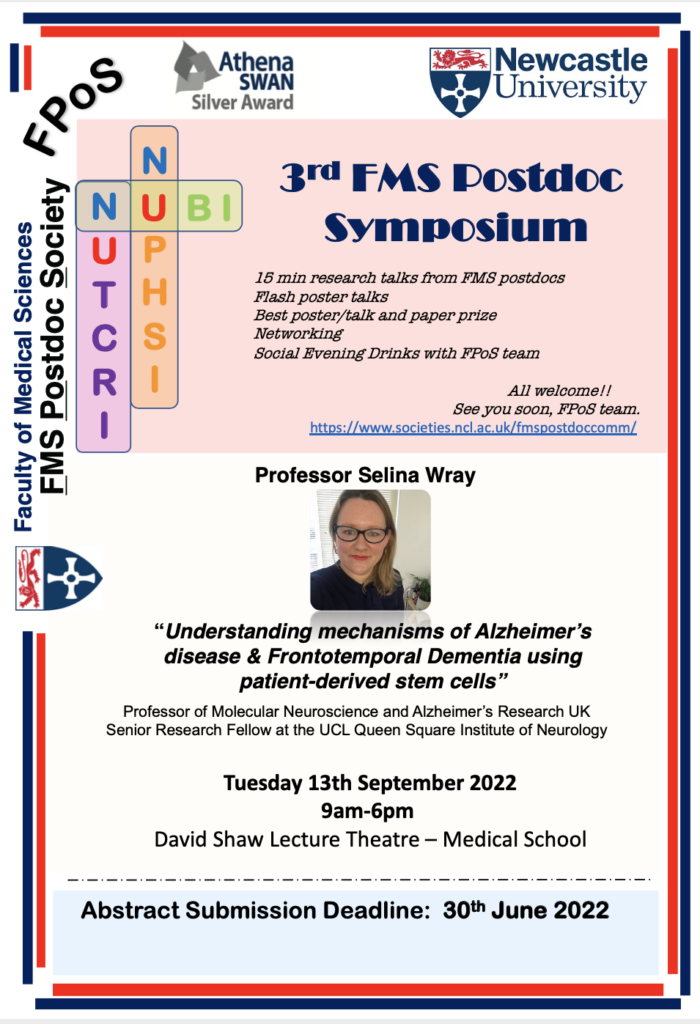When making decisions about the future if your academic career you may feel that you are at the beginning a complex set of crossroads which can be quite confusing and at times frustrating. As there is no defined route when it comes to career progression it can be difficult to decide which direction is the right one to take, and when is the right time to make the correct next step to advance your career. Obtaining independent funding such as a fellowship is one option that can demonstrate your potential to be a future leader in your chosen research field. However, for early career researchers these opportunities can be highly competitive as successful candidates are required to demonstrate their ability to produce meaningful research, manage multiple projects (and potentially students) and communicate their work to a wider audience. Not everyone has the same experience when applying for a fellowship, but we asked Dr Kirsty E. McAleese (Institute of Neuroscience, and a recently appointed Alzheimer’s Society research fellow) to describe her motivation, experience, and give her top tips when applying for a research fellowship.
Why a fellowship?
I had a clear career aim of staying in research and continuing and expanding my work in a niche area of dementia research. A fellowship is the first step to independent research and developing and leading my own research group.
How did you decide which schemes to apply for?
I chose to apply for a dementia charity funded fellowships as these are very keen on retaining young researchers already in the field and tend to be slightly less competitive than other general funding bodies such as the Wellcome Trust and the MRC. Networking with funding bodies/charities can be very important in this aspect; I was previously funded by and won an award with the Alzheimer’s Society so I was on their radar and they knew my name, so use anything like this to your advantage.
Where to start…
My mentor told me that I must tick three boxes: 1) my development as a scientist, 2) the idea, and 3) the institute you choose to work at. Being enthusiastic and passionate about your research is one aspect; but a fellowship is also about your development into an independent researcher and learning new skills. I have worked in neuropathology for many years and part of my fellowship is branching into in vitro models. Making sure you have the right team supporting you and the facilities to successfully complete your project is key. I did not move to a different University to achieve this; sometimes it is required but not always necessary as long as you can justify why you want to stay at a particular institute and have an external collaboration in place, you can still demonstrate your aim to develop as a scientist.
How long the application took…
Writing the application took a solid three months but I had recently published a paper in the field and, therefore, already had a good understanding of the relative literature. I would suggest at least 6-7 months from start to finish: it seems like a long time but it will go very quickly, and you need to have it read over numerous times before submission (I submitted draft 8!). Also, don’t forget the application must go through the University’s grant application and peer review system, which requires a few months notice at least, and final submission confirmation is done by the University, so always submit to the funder a few days early.
What were the most difficult parts?
I found the time scale of an application challenging. You have to plan ahead 18 months for any eventuality, i.e., success, organising bridge funding if staying at the same institution, or unemployment! The application itself takes around 6 months and then an additional 6-7 months for review, and hopefully an interview (where you will sometimes only get 2 weeks notice!), before you know if you have been successful. Then there is the processing of the paper work and generating a start date, which took 4 months.
Top tips
1) Do your research on the funding bodies as they are all slightly different. Most have application help or webinars available.
2) Ask as many people as possible from different disciplines to read it! It is likely a non-expert will review your application so it must be very clear and not too complex.
3) Remember to tailor the application to ‘I’ and not ‘we’. It felt very uncomfortable doing so but it is the only time you will do this. Remember a fellowship is about you and you only. Sell yourself!
4) Always have contingency plans embedded into your project design in case experiments fail (especially if techniques are novel): what would you do to still guarantee success of the project? This was a question brought up in a mock interview and it was asked at my real interview!
For guidance and advice on fellowship applications to external funders, and who to contact if you are thinking of applying see the following links: –
https://newcastle.sharepoint.com/hub/medical/Pages/fellowships.aspx
https://microsites.ncl.ac.uk/njro/researchers/research-idea/funding-opportunities/finding-funding-contacts/
The MRC has developed an interactive career framework that provides information on research career pathways and funding streams available for early career researchers who want to establish an independent research career.
https://www.mrc.ac.uk/skills-careers/interactive-career-framework/

